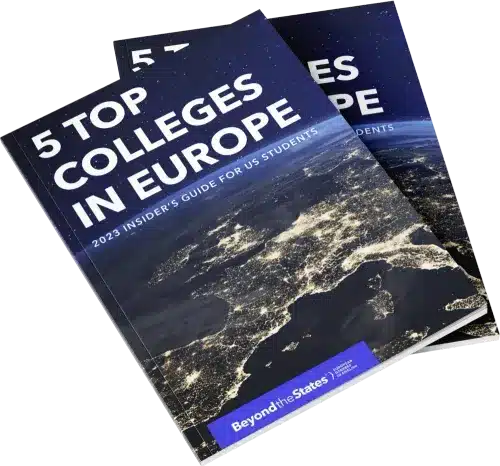Thoughts on Central European University
You have likely heard of George Soros, the American billionaire, who was born in Hungary. While there are many newsworthy stories about him, one that I find fascinating pertains to his involvement with Central European University (CEU) in Vienna and Hungary.
Soros founded CEU in 1991 to develop future generations that could build and maintain open and democratic societies. The recent fall of communism, Soros’ financial backing, and master’s degree programs that were accredited by both Hungary and the US proved a successful combination for the school. It was considered Hungary’s most prestigious graduate school, training presidents, diplomats, and leaders in major institutions.
FREE INSIDER’S GUIDE

Top 5 English-Taught Colleges in Europe
Kickstart you education abroad with a powerful degree taught entirely in English, all without taking on any student loans!
But Viktor Orban (the right wing Prime Minster of Hungary) had issues with Soros’ political views, and “has long viewed the school as a bastion of liberalism, presenting a threat to his vision of creating an “illiberal democracy,”. So in 2017, the Orban administration introduced new rules aimed to render CEU illegal in Hungary. CEU administrators and others, including seventeen Nobel Prize winners, 80,000 protesters, and numerous universities around the world, rallied against the government’s move, but to no avail. Since they couldn’t lawfully continue teaching their US accredited programs in Hungary, they moved the university to Austria in 2019.
My previous trips to Budapest and Vienna didn’t align with a visit to CEU, but after seeing signs of their growth and how they have flourished since their move – in particular with the addition of bachelor’s degrees – I knew I had to get over there!
I was told ahead of time that I would need to provide proof of my COVID vaccination or a negative quick test when I arrived for the visit. Security in the lobby was checking this for all who entered. I was struck by how orderly and friendly this process was, which is not the case everywhere. My next impression was around the remarkable facilities. Even though they are building a new, large, American style campus in another part of Vienna, they really went above and beyond with this temporary facility. Had I not been informed about the new campus, I would have assumed that this was a permanent facility. In fact, they invested millions in the remodel of the historic building that was previously a bank. The building holds classrooms with modern technology, computer labs, a large library, an auditorium, a cafe, and many student areas (kitchen areas, meeting spaces, study spaces), and faculty/staff offices.
There are 1300 students at CEU, almost all are international students (meaning not Austrian), and there is not one dominant culture – so English is widely spoken outside the classrooms as well. Can you imagine the perspectives brought to the classroom discussions and social events? The 370 faculty members provide an incredible faculty to student ratio and professors are quite accessible to students. In fact, their offices were intentionally integrated near classrooms and student spaces to facilitate their accessibility.
There are also 395 permanent staff members who provide a large array of resources and services. These include a Community Engagement Office, Student Life Office, Research Centers, a Press office, Counseling Services, a Medical Center, and a very robust Career Service department.
Another thing the school handles is first year housing, which is required. All first-year students live in shared student housing in a nearby district of Vienna with easy access to the metro and city center. The apartments are modern and furnished with a full kitchen, living room, bathroom and two bedrooms. In addition, the building includes a gym, laundry facilities, and a study lounge for meeting with other students or finding a quiet space to work.
As noted, the three bachelor’s degree programs are new. Two began in 2020, and one began this year. Each are incredibly multidisciplinary, with specializations chosen in the second year. Students in the Culture, Politics, and Society program can major in Cultural Heritage, Environmental Studies, Gender Studies, History, Human Rights, International Relations, Medieval Studies, Nationalism Studies, Philosophy, Political Science or Sociology/Social Anthropology. The Philosophy, Politics and Economics majors are, of course, Philosophy, Politics, or Economics. Lastly, the new Quantitative Social Science program includes two areas of focus, with choices of Sociology, Economics, Environmental Science, Political Science, and Data Science. Students can take electives from the other programs as well. The degree programs can be completed in three years for an Austrian degree, or 4 years to receive both the Austrian and American degree. The third year includes the thesis and the fourth includes a capstone project. Students are encouraged to study abroad and partner universities include Sciences Po (Paris), Università Bocconi (Milan), London School of Economics, Stockholm School of Economics (Sweden) and Bard College (US).
Admissions is competitive. After reviewing grades, recommendations, a motivation letter, essay, CV, andactivities, the top sixty students per program are invited to an interview. This interview includes a discussion with a panel about a chart or text that the student is given an hour before the meeting. The thirty candidates (per program) who rank highest in the interview are accepted.
The Master’s degree options warrant their own blog as the number and scope are vast and incredibly interesting! I will certainly be putting this school on Sam’s radar when he starts exploring grad school!
A bachelor’s degree from CEU offers a global perspective on some of the world’s most important issues and the skills to work on them. It aims to develop the ability to read and think critically, analyze, write well, and express yourself effectively – skills transferrable to a wide variety of careers.










